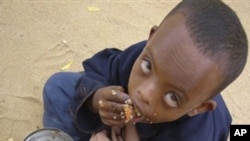The United States said Wednesday that it is prepared to “test” the willingness of the Somali rebel group al-Shabab to allow Western food aid to reach millions of Somalis threatened by drought. Secretary of State Hillary Clinton has ordered a coordinated U.S. response to try to prevent another famine in the Horn of Africa like the one that struck some two decades ago.
Al-Shabab, which controls most of Somalia’s territory and is listed by the United States as a terrorist organization, has until now barred outside humanitarian aid groups from areas it dominates.
But amid a looming hunger crisis, the group says it will welcome all aid agencies, including non-Muslim ones, to assist in drought relief efforts. And the State Department says the United States intends to test that willingness.
Secretary of State Hillary Clinton convened a meeting Wednesday of senior officials of the State Department and the U.S. Agency for International Development on the Horn of Africa drought. A senior official here said she issued instructions to do whatever is possible to avoid another humanitarian disaster in the region.
Drought conditions in Somalia and parts of Ethiopia and Kenya are being compared to those of the early 1990s when famine claimed more than 300,000 lives. At the time, large amounts of international aid were commandeered by Somali warlords to help fuel the country’s civil war. There is concern among Western governments and aid groups that al-Shabab, which is battling Somalia’s Transitional Federal Government, might do the same.
But an al-Shabab spokesman in Mogadishu said Tuesday that the group is lifting a ban on access to aid groups and that all agencies whose mission is only humanitarian relief will be allowed in.
A senior State Department official said now that al-Shabab is “making noises about being a cooperative player,” it is incumbent on the United States and other donor countries to test whether the group is ready to let starving people receive humanitarian aid.
State Department Spokeswoman Victoria Nuland said the drought might have displaced 1.5 million people in Somalia, Ethiopia and Kenya, and that the United States has begun positioning relief supplies to respond to the crisis.
“We have already delivered some 19,000 metric tons of food to the World Food Program, and a lot of that has already been staged in warehouses to insure rapid delivery a to insure rapid delivery into the area. This morning, Secretary Clinton asked our folks to continue to look at this, and work hard on what we can do together and what we can do with neighboring governments to ensure that we don’t have another massive humanitarian catastrophe," she said.
The U.N.’s World Food Program pulled out of hard-hit northern Somalia last year because of threats and extortion demands by al-Shabab. But a U.N. spokesman in Nairobi said the organization is prepared to cooperate with anyone who can work to ease the crisis, and save lives.
Two seasons of little rain in the region are threatening an estimated 10 million people.
The British-based relief group Oxfam says at least 500 people have died from drought-related causes since the beginning of the year, but that the toll could soar later this year if the drought persists.
US to Test al-Shabab’s Willingness to Allow Food Aid to Somalia




